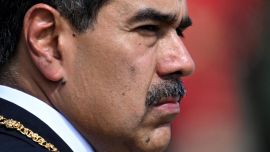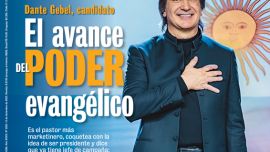Colombia's Truth Commission, established to probe atrocities committed during the country's near six-decade civil conflict, presented its final, 896-page report on Tuesday.
The document is the product of years of work that included hearing testimony from more than 14,000 victims of the fighting between leftist guerillas, far-right paramilitary groups and state agents. Also included in the report are the accounts of former fighters who gave up arms or are prisoners today, as well as soldiers and former presidents.
Authorities say the conflict resulted in some nine million people either killed, disappeared or displaced.
Priest Francisco de Roux, who has headed the commission since its creation in 2017, handed the monster report to president-Elect Gustavo Petro during a ceremony at a theatre in Bogotá.
It makes for grim reading – packed with accounts of forced disappearances, rape, massacres and torture, and concludes that Colombians suffer from "collective traumas" passed down "from one generation to another."
The Truth Commission, an extrajudicial body, is one of the entities set up as a form of victim reparation that came out of the 2016 peace pact that disarmed the FARC guerrilla group. There is also a court, Special Jurisdiction for Peace (Jurisdicción Especial Para la Paz, JEP), to investigate and punish the worst crimes, and a special unit to find missing victims.
The report entitled No hay futuro si no hay verdad (“There is no future if there is no truth") will be published in chapters over the next two months, when the commission will officially cease to exist.
De Roux handed the report to Petro with 19 recommendations – which are not binding – to give full effect to the peace pact, including seeking peace with the ELN, the last guerrilla group operating in the country.
With this report, supported by the United Nations and the Catholic Church, "we make a call to society, the state and the international community" for the non-repetition of the conflict, De Roux declared.
Outgoing President Iván Duque, who was critical of the 2016 peace deal and of negotiating with guerrillas, did not attend Tuesday's ceremony and sent a delegate in his stead.
Accompanied by vice-president-elect Francia Márquez, an Afro environmentalist who suffered the conflict first-hand, Petro pledged to heed these recommendations, declaring that "they will become effective in the history of Colombia."
"There are expectations of peace, of a great peace, a comprehensive peace, the possibility of moving into an era of peace," added the former M19 guerrilla who laid down his arms in 1990 to enter politics.
Petro has already said he would resume talks with the ELN, which were suspended under his predecessor.
Violence has flared up again in Colombia despite the peace accord. Areas abandoned by the now-defunct FARC guerrilla group have become battle grounds for control of drug and illegal mining resources between armed groups – including FARC dissidents – holding many rural communities in a state of siege.
Six years after the signing of the peace agreement, the JEP has indicted several FARC leaders for thousands of kidnappings, along with Army commanders for the execution of civilians. Sentences are expected to be handed down later this year.
Right-wing parties in Colombia have generally been critical of the Truth Commission, accusing it of holding “bias” against the Armed Forces. According to the report, members of the security forces allied themselves with drug-traffickers and paramilitaries in order to acquire greater power and wealth.
– TIMES/AFP

























Comments